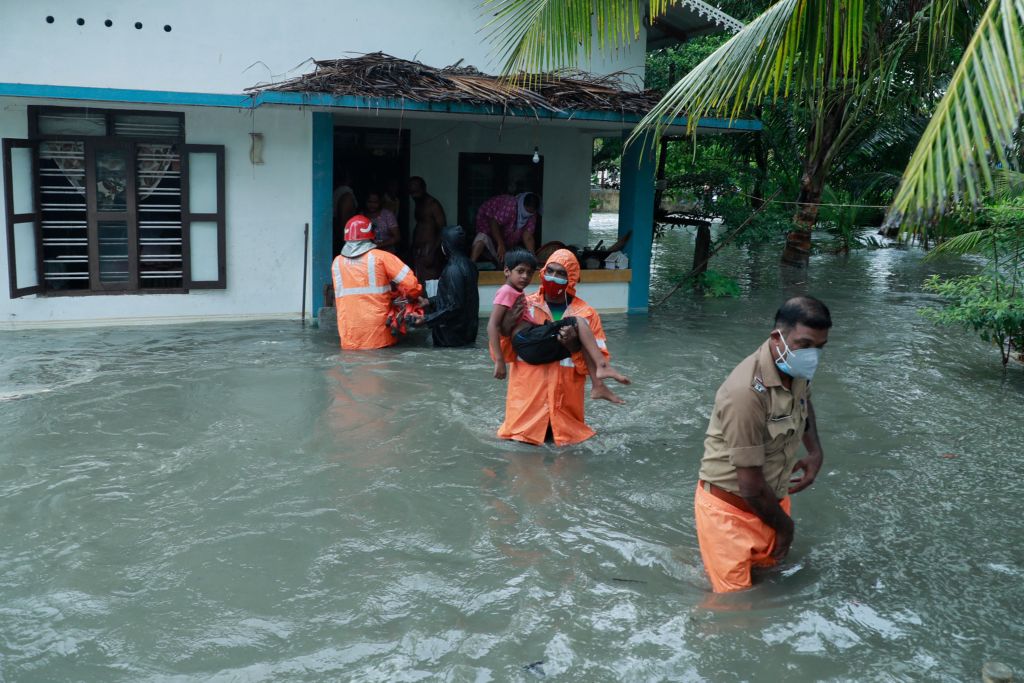
As people in Kerala watch their homes wash away in floods and landslides, increasing numbers of families living in the normally idyllic backwaters of the south Indian state are choosing to move away. They crowd into villages and cities on higher ground, mostly unaware of their new status: climate change refugees.
They are not the only ones. New research by the International Institute for Environment and Development finds that more than two-thirds of Indian households blame drought, floods, heatwaves and hailstorms for causing them to migrate. The report claims to settle the debate over whether migration can be linked to extreme weather.
“The sheer fury of nature must make us think about what the future will be like and about the crises we must avert at all costs,” urged Sunita Narain, the director of India’s Centre for Science and Environment.
Yet, India is unlikely to commit to strengthening its pledges to cut emissions, known as “nationally determined contributions”, at the upcoming United Nations Climate Change Conference, Cop26, in Glasgow.
The fact that India’s prime minister Narendra Modi is attending the summit – while all the other leaders of the Bric nations (Brazil, Russia, India and China) are not – is a boost for global efforts to tackle climate change.
“India plays an important role in this and the prime minister has had a number of conversations with Modi on the importance of climate change, so we look forward to discussing it with them further,” Prime Minister Boris Johnson’s spokesperson told reporters last week.
The pressure is also on India from the US, which is seeking to reassert leadership on the world stage. John Kerry, the US climate envoy, has visited India twice in the past few months, urging the Modi government to raise its climate change ambitions and announce a commitment to bringing emissions down to net zero in the next few decades.
But India is reluctant to commit to being net zero by 2050. Its drive to raise the standard of living for its 1.38 billion people means there is a continuous push to build everything from roads, bridges and airports to schools, hospitals and homes – all energy-intensive infrastructure.
[See also: What will it take to overthrow King Coal?]
India relies on heavily on coal, using the fossil fuel to meet about half of its demand for energy. The carbon that coal will send into the atmosphere for the next 20 years is likely to exceed all of Europe’s planned reductions over the same period.
In the capital New Delhi, the world’s most polluted city by some metrics, affluent residents know this carbon catch-22 well. They shut their windows and turn on their air purifiers. They replace their pandemic masks for thicker weaves that will stop microscopic pollutants enter their lungs and bloodstream.
They are well aware of the dangers of a warming Earth, but become equally panicked when there is talk of coal shortages and the potential power cuts that they could entail. The people baulk, not merely at the discomfort of intermittent electricity at home, but at the cost to businesses and the environment when dirty diesel generators are switched on to fill the power gap.
While India is the third-largest emitter of greenhouse gases, just behind the US and China, it actually consumes much less energy per person than both countries. And, like many developing nations, India is aggrieved that it is being urged to clean up its energy consumption by countries that have already developed their infrastructure, from the Industrial Revolution onwards – and at great cost to the environment.
“The fact is that the carbon budget of the world has been appropriated by a few countries and only crumbs are available for the rest… At Cop26, we need to confront the reality of this inequity and ensure that it is addressed,” wrote Narain.
At Cop26, India is likely to suggest that richer, already-developed countries commit more money to helping poorer countries fight climate change due to their high historical share of emissions. Wealthy nations made a pledge in 2009 to send $100bn a year to help finance clean energy initiatives in developing countries by 2020. They have so far have fallen short of that promise, and commitments made this week will only see this goal met in 2023.
Nonetheless, India’s push into clean energy is a subject that Modi is likely to discuss with pride at the talks. The country has already installed over 100 gigawatts (GW) of renewable energy, and Modi also has recently committed to increasing India’s green energy capacity to 450GW by 2030, with some expecting new announcements of further commitments around renewables to be made in Glasgow too.
It remains to be seen, however, how far he is ready to go in also pledging to massively reduce reliance on fossil fuels both for the sake of the global climate, and people’s health and lives in India.
[See also: The price of the planet: who will step up at Cop26?]





